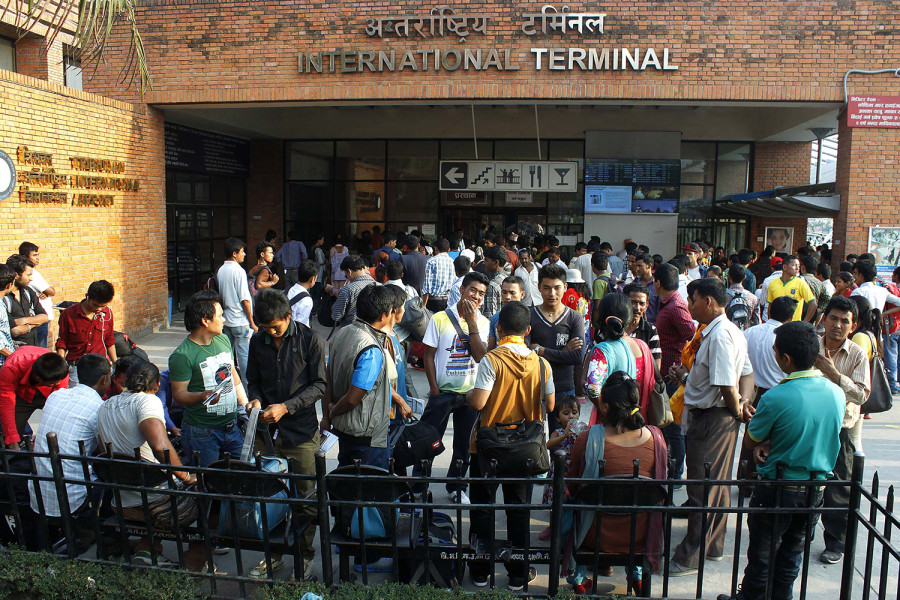National
For Nepali migrant workers abroad, no hearth and no home
As Nepal has closed itself off to all incomers, including its own citizens, even Nepalis migrants who have visas expiring are unable to come back home.
Chandan Kumar Mandal
As Covid-19 began to spread and occupancy fell in the hotel that he was working at, Laxman Lamichhane decided that he would come home. Lamichhane was planning to fly back from the United Arab Emirates on April 10, the day his vacation days began, but when the Nepal government’s increasing restrictions on travel, he was forced to change his plans.
Last Wednesday, the Nepal government-imposed travel restrictions as a measure to prevent the coronavirus from entering the country. As per the government ban, all passengers, including Nepalis, from the European Union, the United Kingdom, West Asia, Gulf countries and countries like Iran, Turkey, Malaysia, South Korea and Japan, were restricted from March 20 until April 15. The travel restriction was also applicable for all passengers transiting in these locations.
“Most tourist destinations in the UAE are closed and there is not much work in the hospitality industry,” said Lamichhane. “My vacation was starting on April 10 but as there was a travel restriction in place, I had to change my plans.”
A last-minute change meant he had to pay double the airfare. According to Lamichhane, he paid 2,061 dirham, roughly Rs 67,000, for a one-way ticket. The same ticket would cost him between 1,000 to 1,200 dirham (Rs32,600-Rs39,000) on normal days.
Lamichhane landed at Tribhuvan International Airport on Thursday evening, hours before the travel restriction came into place. But there are thousands of others like him, who remain in foreign lands, unemployed and unable to come back home.
All the major labour destinations for Nepali migrant workers, like Malaysia, Qatar, Saudi Arabia, the UAE, Bahrain, Kuwait, Oman and South Korea, have been gripped by Covid-19. The UAE alone has at least 14o confirmed cases with two deaths.
Migrant workers in these countries are simultaneously dealing with fears of infection, job losses and uncertainty regarding whether they will be able to return home anytime soon.
On Friday evening, Prime Minister KP Sharma Oli extended the travel restriction to encompass all flights, including those from China, Bhutan, Thailand and Singapore, which were exempted from the initial decision, until March 31, with a possibility of extension. This has effectively closed all avenues of return for migrants.
“Many visas have expired while others with flight tickets were unable to fly. They are living in uncertainty about their status once restrictions are lifted.” Four of Lamichhane’s colleagues had similar plans of coming home because of the Covid-19 crisis. While Lamichhane returned, the others are still in Dubai, waiting for restrictions to be lifted. “I had also thought of returning home as cities are under lockdown and hotels have turned empty,” said Prakash Bhandari, a chef at a five-star hotel in Dubai.
“With restrictions on both sides, the UAE government will not allow us to leave and the Nepal government will not let us enter. I cannot even travel via a transit country like India.” After announcing the travel restrictions, the government had asked all Nepalis abroad to get in touch with Nepali embassies and consulates for clarity on how to proceed. But a large number of Nepali workers have been taking to social media to reach out to Nepali missions abroad with complaints.
“My visa will expire on March 28. At present, I cannot travel to Nepal. But will I be an illegal migrant worker after my visa expiry? I was thinking of going home on March 27,” Prakash KC wrote on the Nepali Embassy in Malaysia’s Facebook Page.
Although the government’s move is aimed at preventing the Covid-19 pandemic from overwhelming Nepal, imposing such harsh restrictions in a such short span of time has left Nepali migrants with few means of recourse. “Remaining in foreign lands will only add to their expenses, especially as many might have sent back remittance and could be empty-handed,” said Nepal. “Most importantly, their right to mobility has been curtailed, although the restriction measure was imposed for safety reasons. Now, they cannot return to their own country and their right to return to their homeland has been violated.”
According to Nepal, their home country has treated its own citizens as outsiders while host countries do not care much about migrant workers. Qatar deported hundreds of Nepali workers just last week.
Meanwhile, migrant workers like Bhandari have been waiting for the situation to normalise so that they can return home.“In such a crisis or even during normal circumstances, we definitely want to go home and spend time with our families,” said Bhandari. “But the whole world is going through a crisis and we don’t know when we can return home. It’s all uncertain.”




 10.12°C Kathmandu
10.12°C Kathmandu














